The application of AI is opening up great opportunities for personalized education , increasing self-learning capabilities, innovating teaching methods, and promoting lifelong learning. However, it also brings challenges regarding the digital divide, AI ethics, data security, and technological dependence.
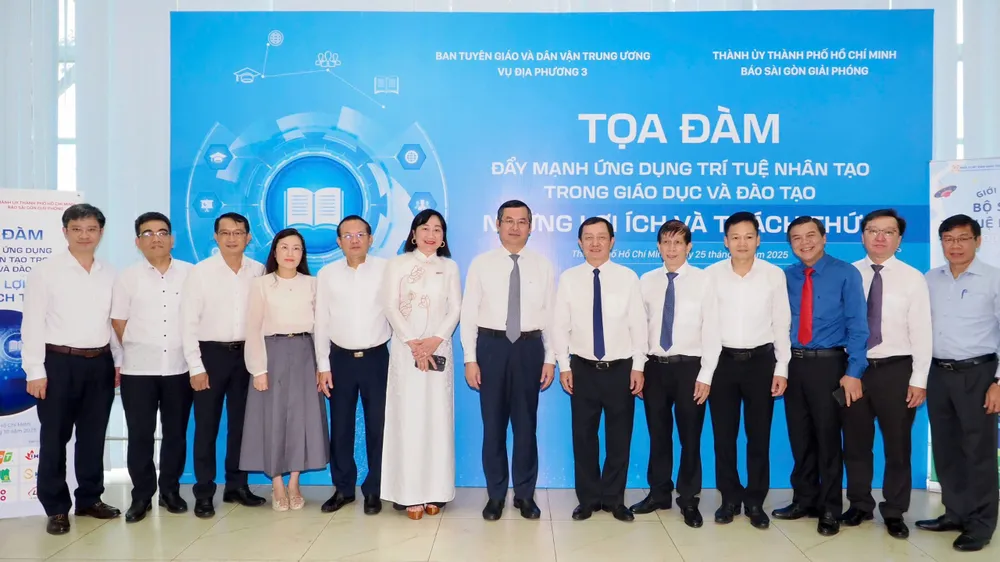
To clarify the spirit of the resolutions, assess the practical implementation, and propose solutions, this morning, October 25th, at the headquarters of Saigon Giai Phong Newspaper, the Central Propaganda and Mass Mobilization Department, in coordination with Saigon Giai Phong Newspaper, organized a seminar entitled "Promoting the Application of AI in Education and Training - Benefits and Challenges".
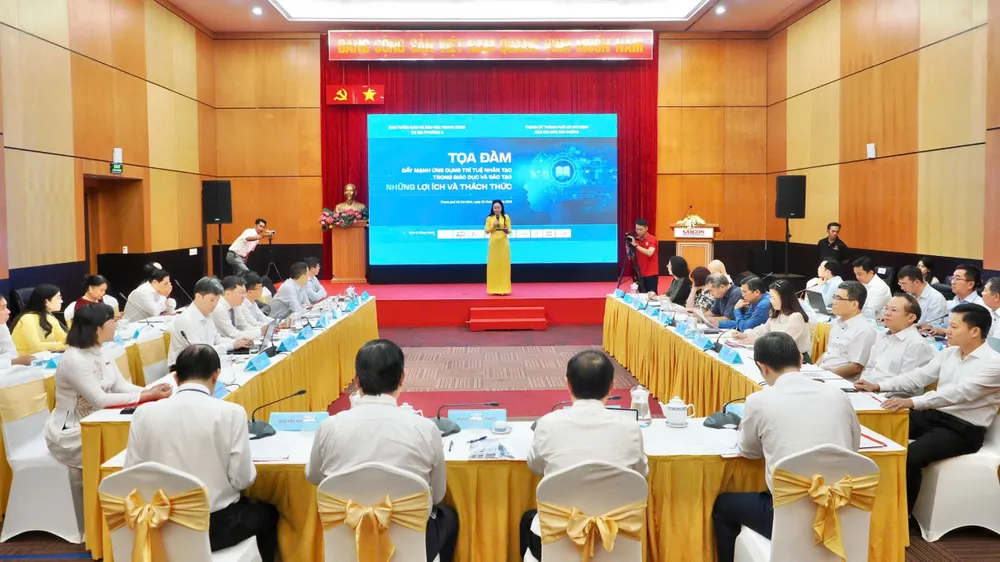
The program was attended by the following comrades: Huynh Thanh Dat, Member of the Central Committee of the Party, Deputy Head of the Central Propaganda and Mass Mobilization Department; Nguyen Huy Ngoc, Director of Local Affairs Department 3; Bui Ngoc Quy, Director of the Health and Sports Department; Phan Viet Phong, Director of the Science and Technology Department; and Le Thi Mai Hoa, Deputy Director of the Education Department - Central Propaganda and Mass Mobilization Department.
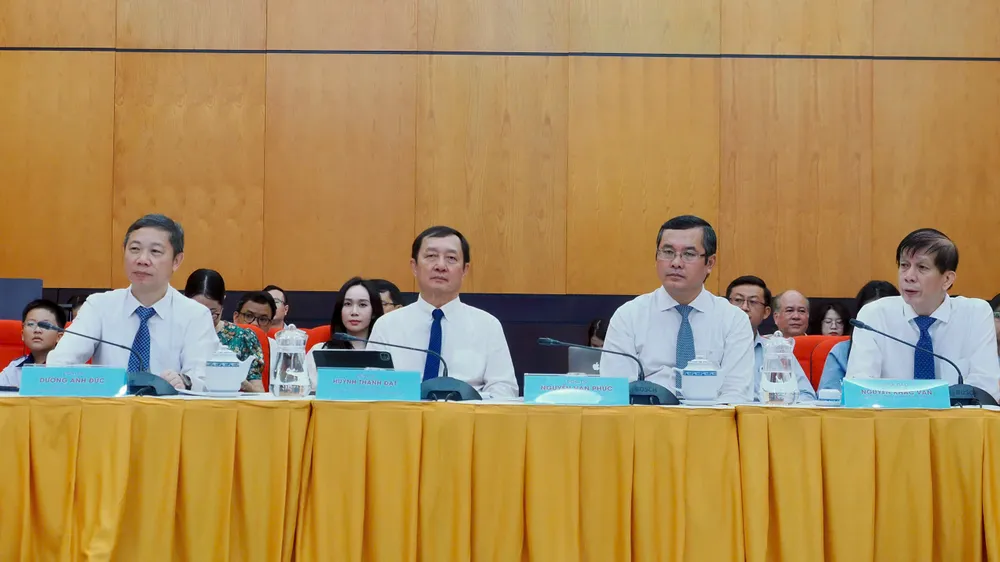
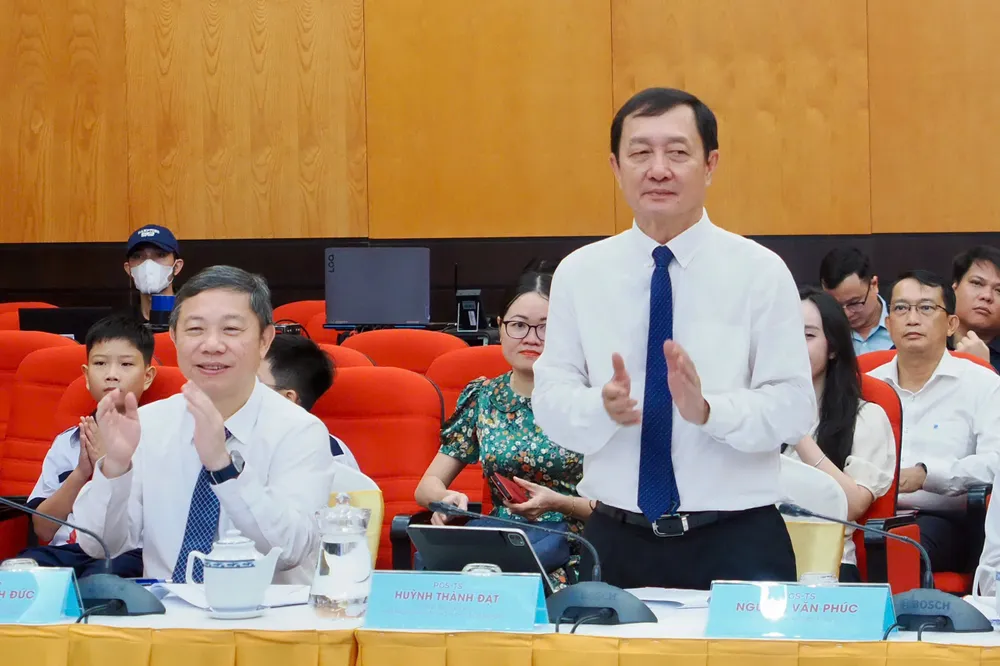
On the part of the Ministry of Education and Training, the program was attended by Deputy Minister of Education and Training Nguyen Van Phuc; and Director of the Southern Center for Education and Training Development Le Thang Loi.
Representing the Ministry of Science and Technology was Mr. Tran Quoc Cuong, Director of the Department of Social Sciences, Humanities and Natural Sciences ( Ministry of Science and Technology ).
Representing the Ho Chi Minh City leadership were Associate Professor Dr. Duong Anh Duc, Member of the Standing Committee of the City Party Committee and Head of the Propaganda and Mass Mobilization Department of the Ho Chi Minh City Party Committee.
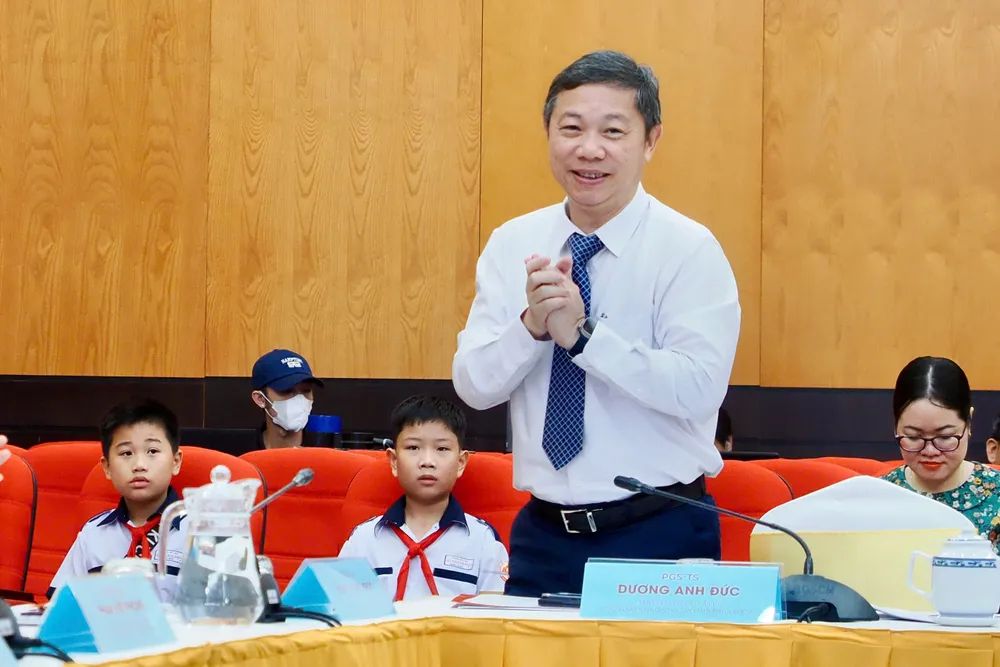
Representing Saigon Liberation Newspaper were journalist Nguyen Khac Van, Acting Editor-in-Chief; and Bui Thi Hong Suong, Deputy Editor-in-Chief.
In addition, the program was attended by leaders from the Department of Education and Training, the Department of Science and Technology of Ho Chi Minh City, and representatives from secondary schools and universities in the city.
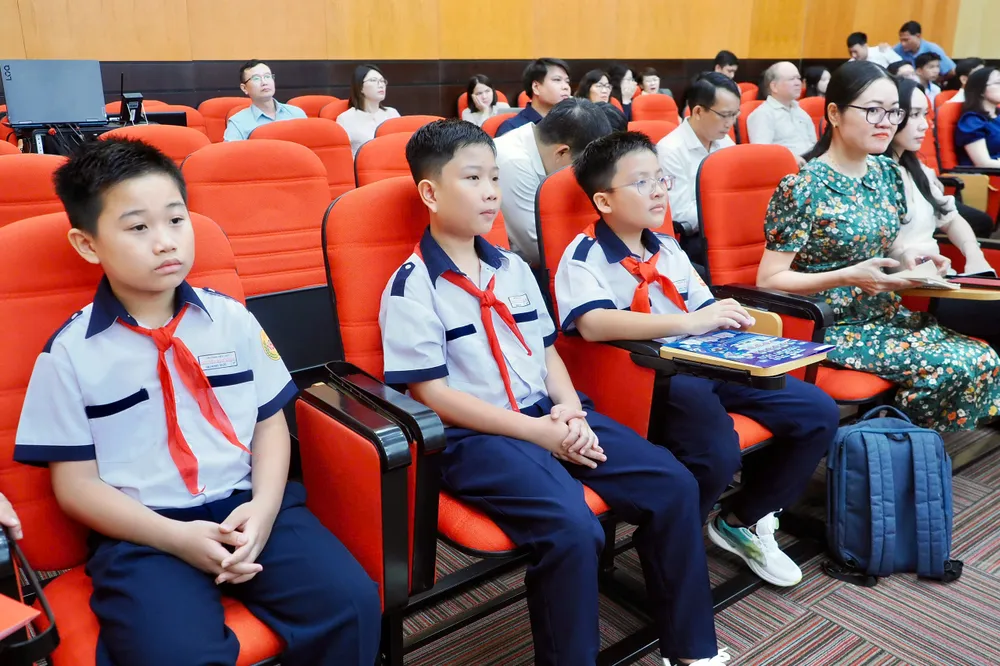
Applying artificial intelligence in education – An inevitable trend.
In his opening remarks at the seminar, Acting Editor-in-Chief of Saigon Giai Phong Newspaper, Nguyen Khac Van, stated that Resolution No. 71-NQ/TW dated August 22, 2025, of the Politburo identifies one of the strategic breakthrough tasks as: "Comprehensive digital transformation, widespread adoption and strong application of digital technology and artificial intelligence in education and training."
This is not just a guiding principle, but also a practical imperative, requiring the Vietnamese education sector to proactively adapt, innovate its thinking, models, and methods to catch up, keep pace with, and potentially surpass in global development trends.
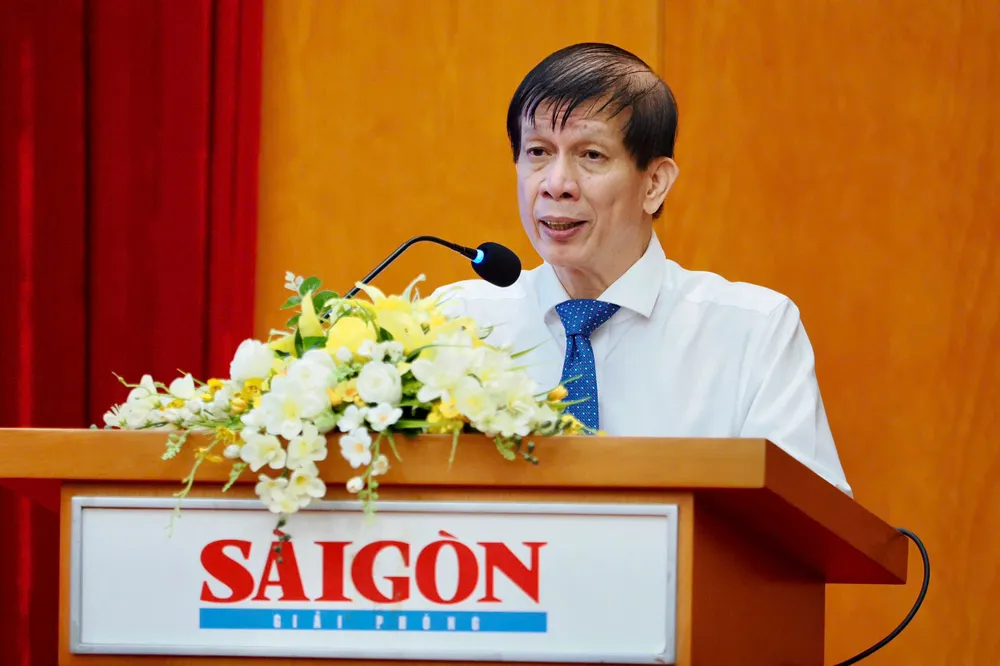
Initial practical experience shows that AI is opening up many new opportunities for Vietnamese education, such as increasing access to knowledge, narrowing regional gaps, and enhancing equality in learning; promoting personalized education, helping each student maximize their potential; stimulating creativity, improving self-learning and research skills, and innovating teaching methods for teachers; contributing to building a learning society and forming lifelong learning habits in the community.
However, alongside the immense benefits, the application of AI in education also poses many challenges: from data security issues, academic ethics, and teachers' digital competence, to the risk of technological dependence and disparities in infrastructure between regions. How can AI serve humanity, rather than replace it, so that technology truly promotes equity and humanistic values in education? These are the issues that need to be discussed in depth at the seminar.
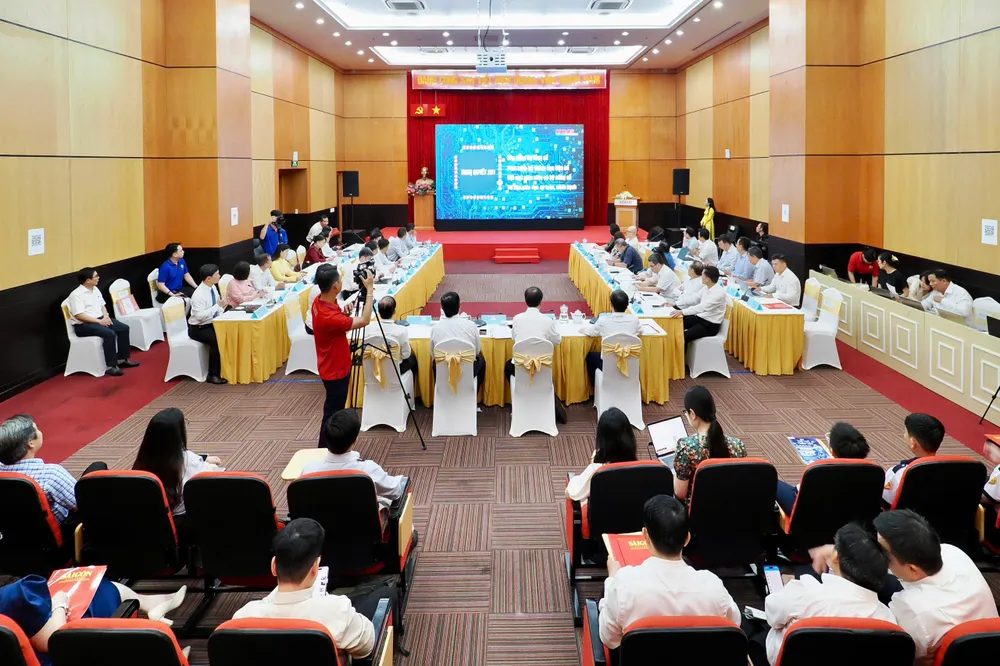
6 recommendations for implementing AI in education
Assessing the urgency of promoting the application of artificial intelligence in education and training, Dr. Le Thi Mai Hoa, Deputy Director of the Education Department of the Central Propaganda and Mass Mobilization Committee , stated that the Party and State have issued many policies on the development of artificial intelligence technology in education and training, such as: Decision No. 127/QD-TTg (dated January 26, 2021) of the Prime Minister on the National Strategy for Research, Development and Application of Artificial Intelligence until 2030; Resolution No. 57-NQ/TW (dated December 22, 2024) of the Politburo on breakthroughs in the development of science, technology, innovation and national digital transformation; Resolution No. 71-NQ/TW (dated August 22, 2025) of the Politburo on breakthroughs in the development of education and training…
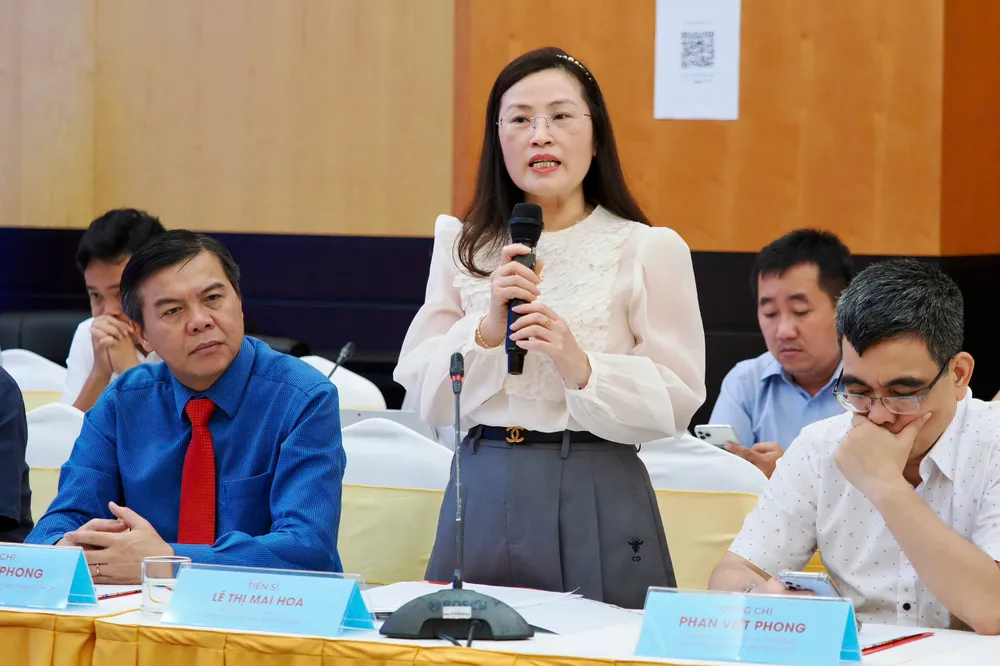
Based on that, Dr. Le Thi Mai Hoa made six recommendations:
Firstly, we need to develop a national AI Literacy program for students and teachers at all levels, from Computer Science and lower secondary to upper secondary education. This is a concrete step in implementing the directives of Resolution No. 71-NQ/TW on "popularizing and strongly applying digital technology and artificial intelligence in education and training."
Secondly , we need to strengthen the training and development of teachers in digital skills and ethical use of AI. Teacher training should not only focus on technological skills but also emphasize the ability to assess, guide, and ensure school safety in the digital environment, while upholding professional ethics.
Third, integrate AI into STEM subjects (Mathematics, Physics, Chemistry, Computer Science) instead of keeping it as a separate subject.
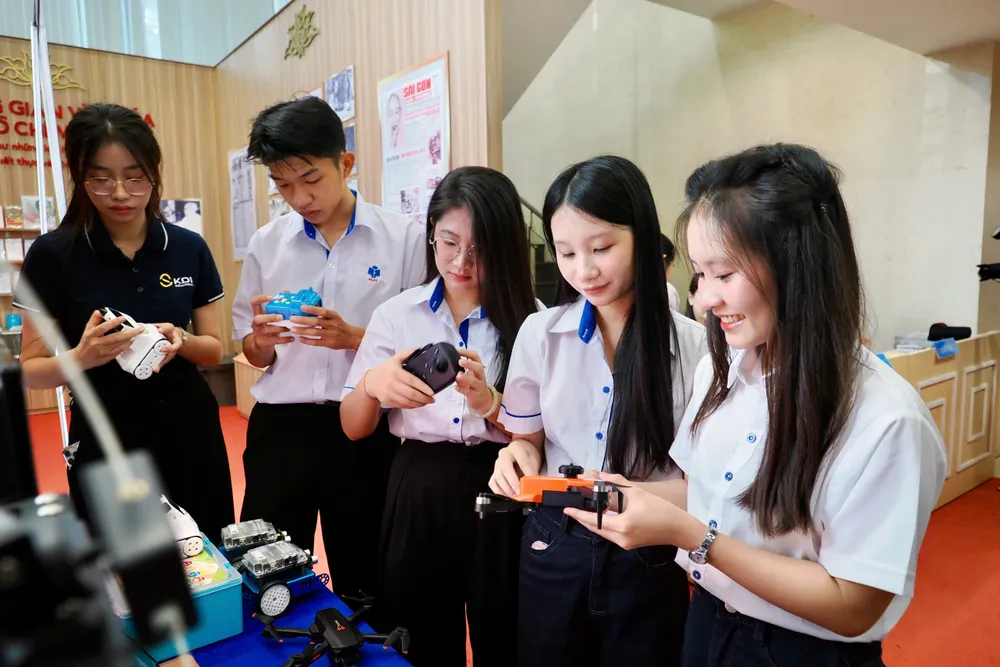
Fourth , establish a regulatory framework on academic ethics and the use of AI in research and teaching.
Fifth , invest in developing digital infrastructure and "Make in Vietnam" AI platforms that are compatible with Vietnamese data and language.
Sixth , strengthen communication and dissemination efforts to raise awareness about AI in education and training among training institutions, secondary schools, localities, learners, teachers, and the education community.
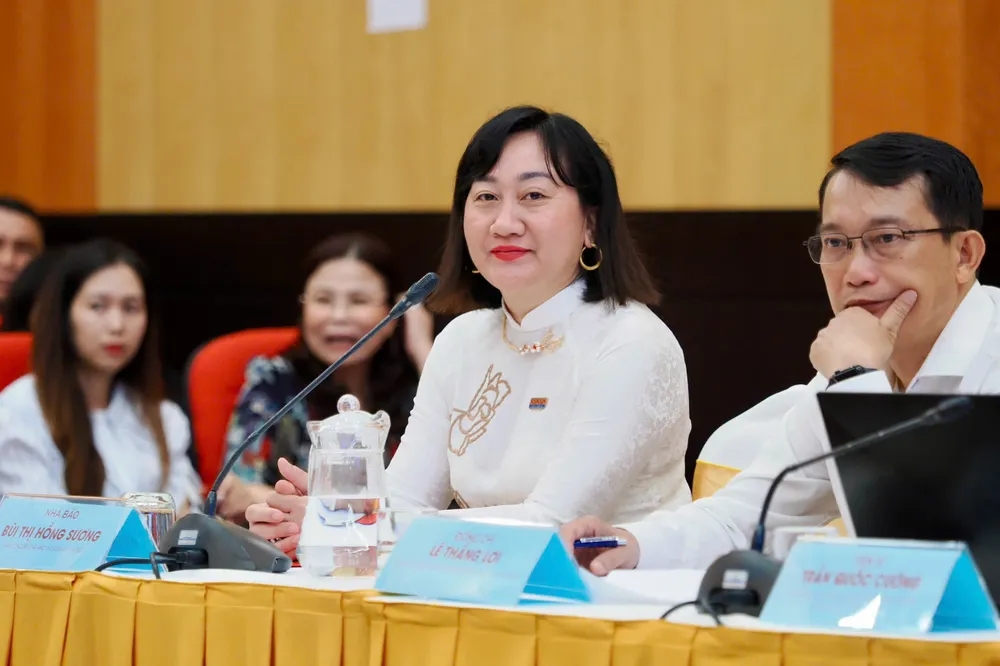
Three strategic pillars for applying AI in general education.
Speaking at a seminar on breakthrough solutions for applying AI in general education, Ms. Nguyen Phuong Lan, General Director of EMG Education Group , said that promoting the application of AI is based on three strategic pillars: English language training; Digital skills training; and Core technologies applying AI combined with the Metaverse.
Ms. Nguyen Phuong Lan cited the practical example at EMG, where AI is applied in the integrated English program; EMG IMMERSIVE LEARNING (teaching English using a holistic language immersion model) and in testing. This has created a closed ecosystem involving AI, from learning to assessment: creating and managing intelligent question banks, supporting grading and competency assessment, AI virtual assistants and teachers to support exam preparation, and analyzing assessment data.
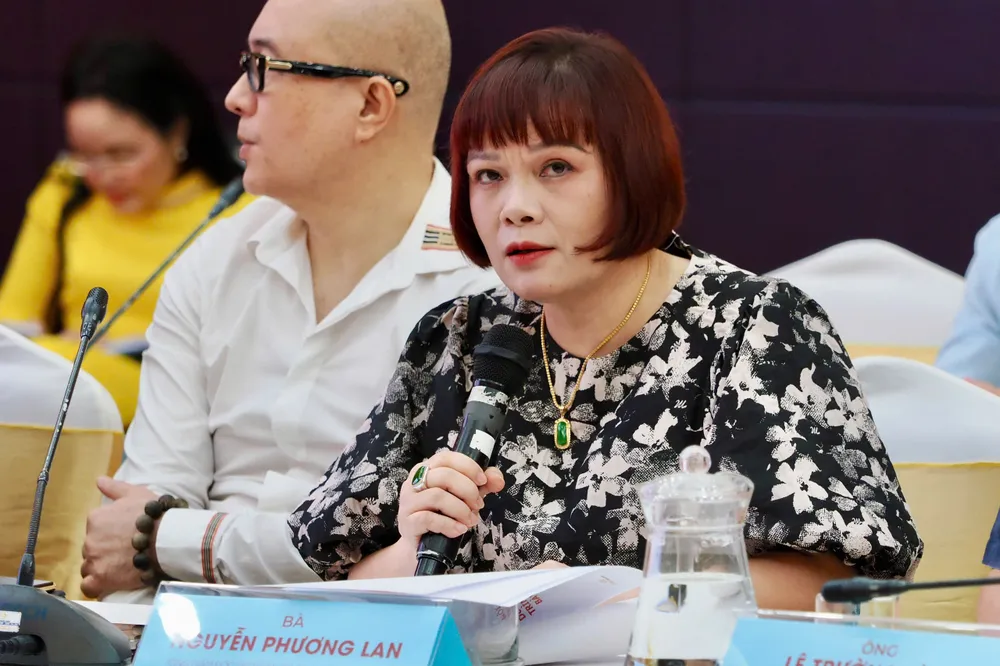
Regarding the digital competency training pillar, AI is applied in integrated digital competency programs oriented towards the international ICDL standard; innovative AI competency training programs; and technology skills training programs. For the core AI-based Metaverse technology pillar, EMG has also implemented several applications such as the Learning Management System (LMS) and the Metaverse platform.
"Core AI technologies not only apply technology to a specific program, but also build a technological platform to deploy a comprehensive, scalable digital school model, contributing to digital transformation and bridging the gap in the education sector," Ms. Nguyen Phuong Lan emphasized.
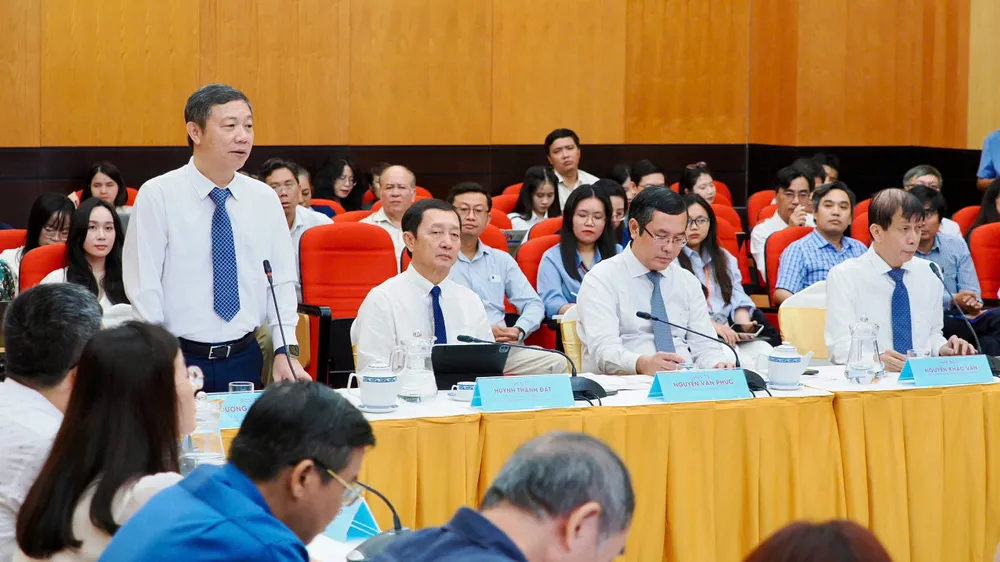
Teaching AI from an early age helps develop programming and problem-solving skills.
Mr. Nguyen Viet Trung, Deputy General Director of KDI Education Joint Stock Company, suggested that AI education could be implemented from the primary and lower secondary levels, rather than waiting until the upper secondary level, in order to equip students with a foundation of knowledge and skills.
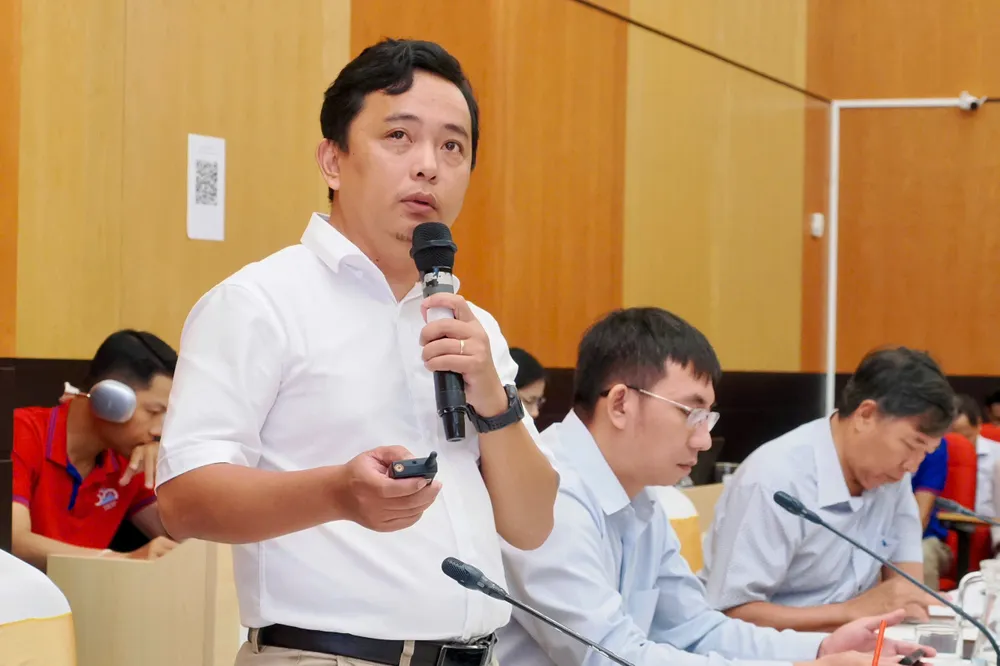
Accordingly, students are trained in programming and algorithmic thinking; problem-solving thinking; and design thinking. Simultaneously, ethical and social issues related to AI are integrated into the curriculum through content such as: understanding AI in daily life; AI bias and misinformation; privacy, copyright, and data security; and AI and career paths that students are interested in.
Digital transformation in education requires a unified software platform.
According to Associate Professor Dr. Nguyen Xuan Hoan, Rector of Ho Chi Minh City University of Industry and Trade , the university is currently investing in a comprehensive digital transformation of its operations, with an investment of approximately 15-20 billion VND for technology infrastructure, training, and management.
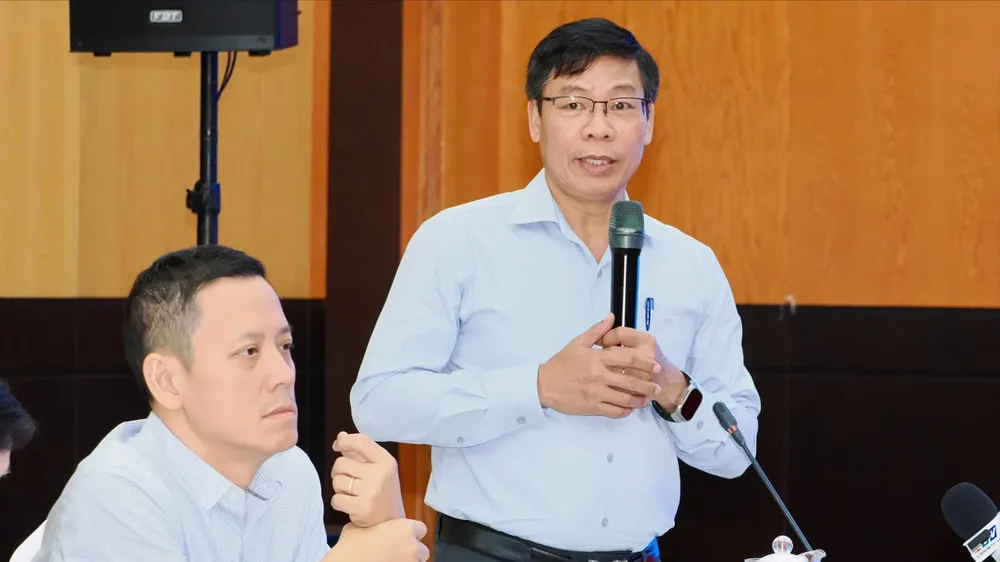
However, the existing software system still has many limitations: it frequently experiences technical errors, and data inconsistencies between subsystems cause data discrepancies, significantly impacting statistics, reporting, and management decision-making. Units face many difficulties in accessing and using shared data. Furthermore, software updates, upgrades, or troubleshooting often require long waiting times, consuming significant time and costs due to reliance on external development units. Currently, even the Ministry of Education and Training's software for management and statistics does not meet the needs of schools in areas such as student enrollment, statistics, and diploma and certificate management.
Associate Professor Dr. Nguyen Xuan Hoan proposed that the Ministry of Science and Technology and the Ministry of Education and Training should research and coordinate the development of a common software system for schools to use synchronously, avoiding the situation where each school implements AI applications in a different way.
Implementing AI in general education requires three solid pillars.
Presenting the paper "Teaching and Learning AI in Vietnamese High Schools," Professor Dr. Le Anh Vinh, Director of the Vietnam Institute of Educational Sciences , stated that the Ministry of Education and Training is currently developing an AI education framework for students from grades 1 to 12.
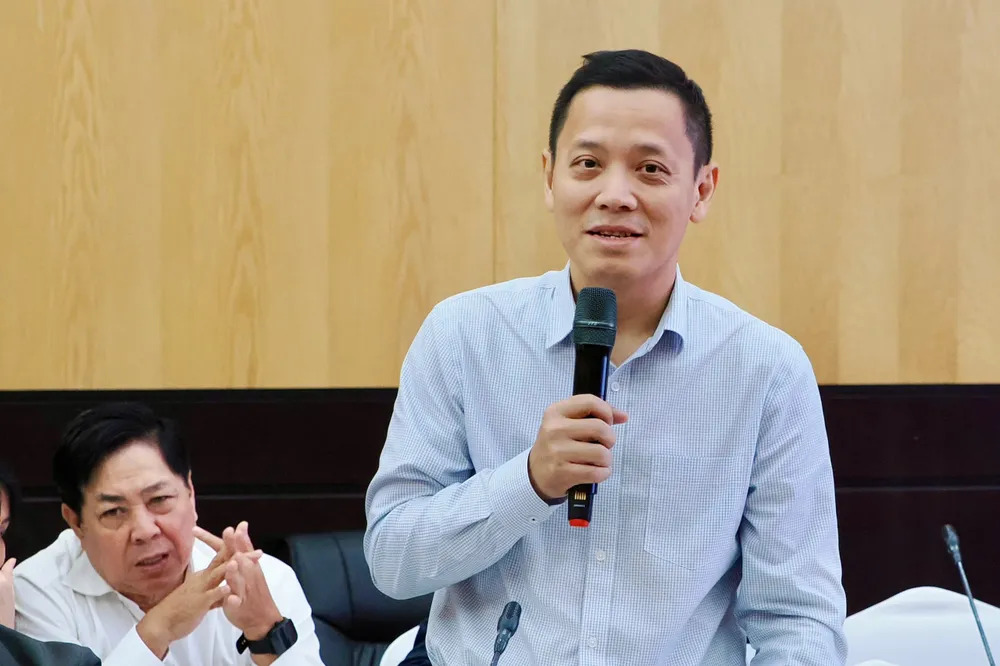
Previously, according to a survey on the readiness of Vietnamese students for AI conducted by the Institute at the end of 2024, over 87% of junior high school students had some understanding of AI. However, only 17% of students applied AI very effectively, 50% applied it effectively, and the remaining more than 30% felt it was average or ineffective.
Some of the difficulties students face when using AI include: lack of knowledge and skills in AI; lack of equipment and technology; lack of guidance from teachers, etc.
For teachers, the survey results show that 76% reported having used AI in teaching. Of these, a worrying percentage (30.95%) expressed doubts about its effectiveness; and over 20% of teachers lacked confidence in applying AI in education.
From a research perspective, Professor Le Anh Vinh raised the issue: “Current technology has not yet thoroughly solved the problems of education, but only addressed the technological aspects. For example, teachers use AI to grade students' papers while students do not need machine-graded exams. Another example is that students and teachers currently use AI tools to save time preparing lectures and doing assignments. However, if these tools are not used intelligently and for the right purpose, their application will not bring practical effectiveness to teaching and learning.”
Based on this reality, representatives from the Vietnam Institute of Educational Sciences proposed that the implementation of AI in general education should be based on three main pillars: a consistent policy framework (ensuring ethical requirements, data security, and long-term orientation); comprehensive and flexible curricula and learning materials; and human and financial resources.
In particular, policies should prioritize building an AI competency framework for students and teachers; guiding the application of AI in teaching; and investing in digital infrastructure to bridge the regional gap.
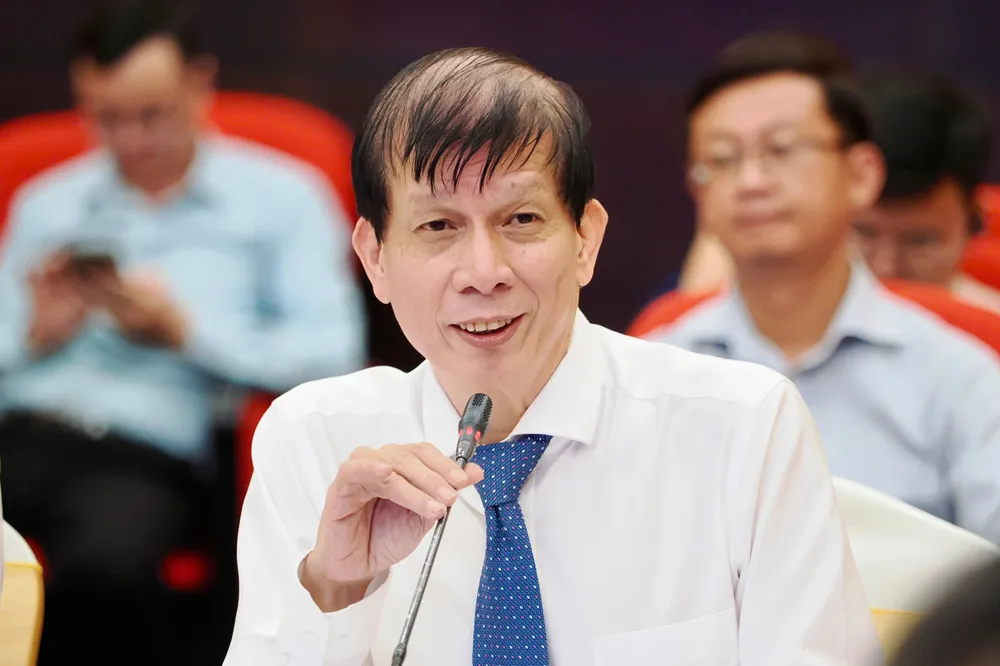
Bringing AI into schools: We need to start with infrastructure and the teaching staff.
As one of the first primary schools in Ho Chi Minh City to inaugurate a Digital Citizenship Skills Classroom, Do Ngoc Chi, Principal of Nguyen Binh Khiem Primary School (Saigon Ward, Ho Chi Minh City) , said that to promote the application of AI, the school started with fundamental steps such as building infrastructure, training teachers, and combining it with innovation in teaching and learning methods.
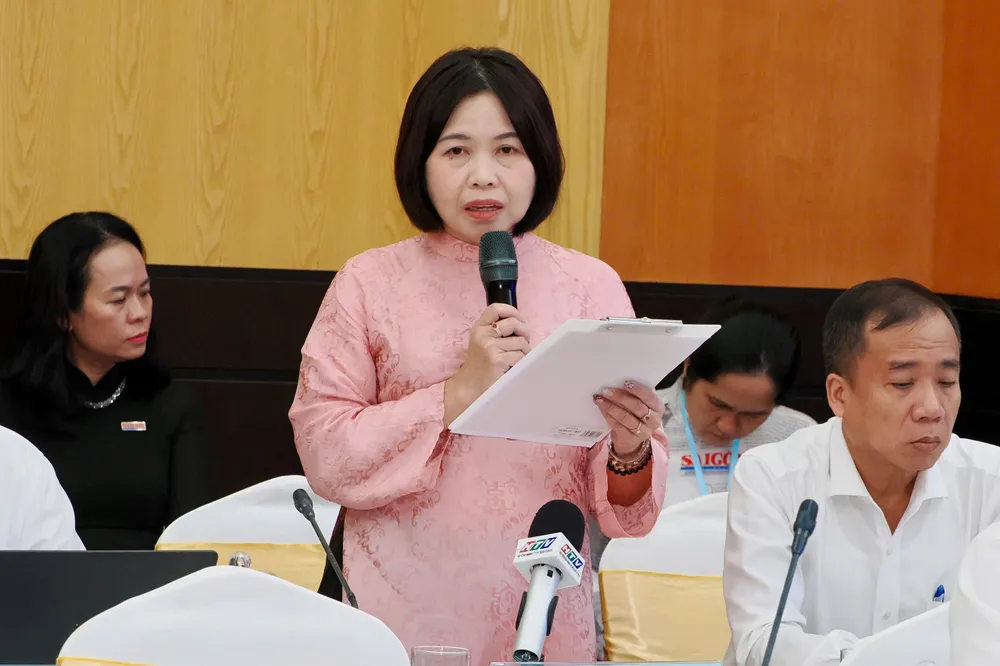
Nguyen Binh Khiem Primary School has invested in a 48m² "Digital Skill Classroom," featuring an open, flexible, and modern design. The room is equipped with 40 tablets, a Smart TV, high-speed internet, a sound system and air conditioning, along with posters, slogans, and QR codes for learning about online safety and digital citizenship principles. This space is not just a technology classroom, but also an educational environment focused on life values in the digital age – where students learn to master technology, rather than being controlled by it.
Regarding staff development, management staff and teachers receive training on utilizing digital learning materials and AI tools to support teaching; applying LMS platforms, Microsoft Teams, and online classroom management software; and integrating digital citizenship skills into lectures and experiential activities. In particular, teachers are encouraged to shift from "knowledge transmission" to "competency development," using technology and AI as companions to help students develop critical thinking, creativity, and civilized behavior in the online space.
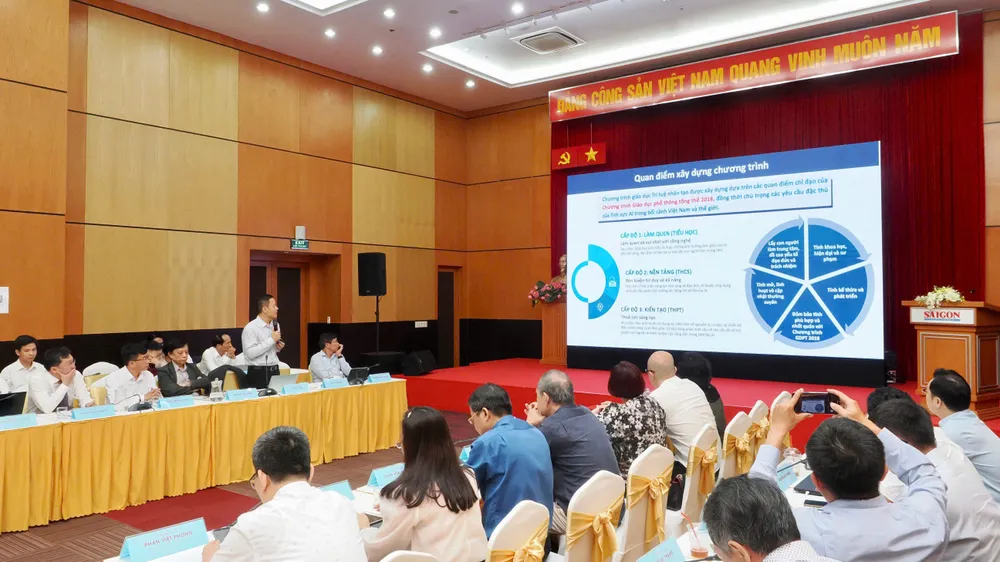
Teaching AI in high schools: A tiered approach is needed, along with addressing the teacher shortage.
According to Pham Thi Be Hien, Principal of Le Hong Phong High School for the Gifted (Cho Quan Ward, Ho Chi Minh City), the school has been implementing the Artificial Intelligence course for the past seven years. Initially, the school offered two levels: a basic course for 10th-grade students and an advanced, in-depth course for students interested in AI research. After some time, the program was adjusted to three levels: basic; advanced - application; and advanced - in-depth research for students aiming to pursue AI studies at the university level.

"I believe that providing students with systematic and structured exposure to AI from the secondary school level is necessary and should be expanded in the context of the digital age," expressed the Principal of Le Hong Phong High School for the Gifted.
Based on practical implementation, Ms. Pham Thi Be Hien believes that the biggest difficulty currently is the shortage of teachers with formal training in AI. This is a problem that needs to be solved, and solved soon. "Currently, the school has chosen to contract with lecturers from universities and engineers specializing in artificial intelligence. At the same time, we are organizing in-depth training for the school's computer science teachers," Ms. Hien stated.
The School-Business-Artificial Intelligence Model
Associate Professor Dam Sao Mai, Vice Rector of Ho Chi Minh City University of Industry, stated that businesses and high-tech industries are experiencing a shortage of digitally skilled personnel. Recent surveys show that up to 73% of employers are having difficulty finding qualified candidates.
The Vice Rector of Ho Chi Minh City University of Industry proposed a dynamic linkage model: University - Business - Artificial Intelligence. In this model, AI is not merely a tool, but plays the role of a "central nervous system," creating a value cycle, connecting and transmitting information continuously in real time between the classroom and the labor market.
However, in light of the risks associated with the technology's downsides, Associate Professor Dam Sao Mai argues that a responsible governance framework is needed to ensure AI becomes a valuable ally, not an uncontrollable force. The Ministry of Education and Training should consider establishing an AI Ethics Council in education to ensure the fairness and transparency of algorithms and, most importantly, to affirm that all final decisions must still be made by humans.
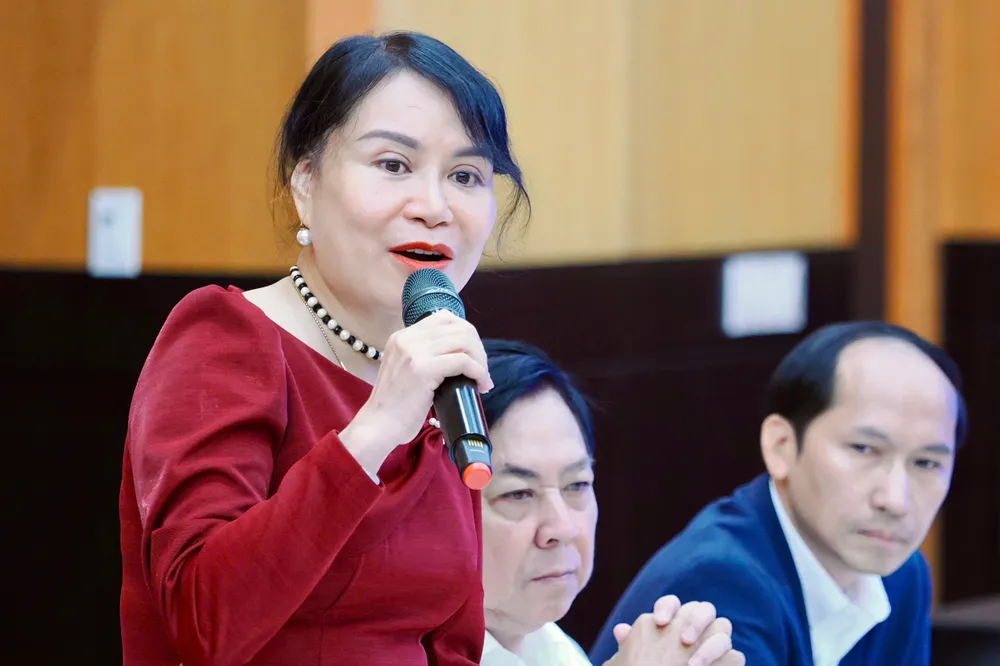
Associate Professor Dam Sao Mai suggested an "innovation alliance" : "We propose that the Ministry of Education and Training promptly issue a Circular providing specific guidance on the application of AI in higher education. In addition, the State could consider establishing a Digital Transformation Fund for higher education. This fund would be a strategic investment tool, prioritizing funding for projects with participation and matching capital from businesses. Simultaneously, businesses must become more involved, instead of just being recruiters and complaining about a shortage of manpower."
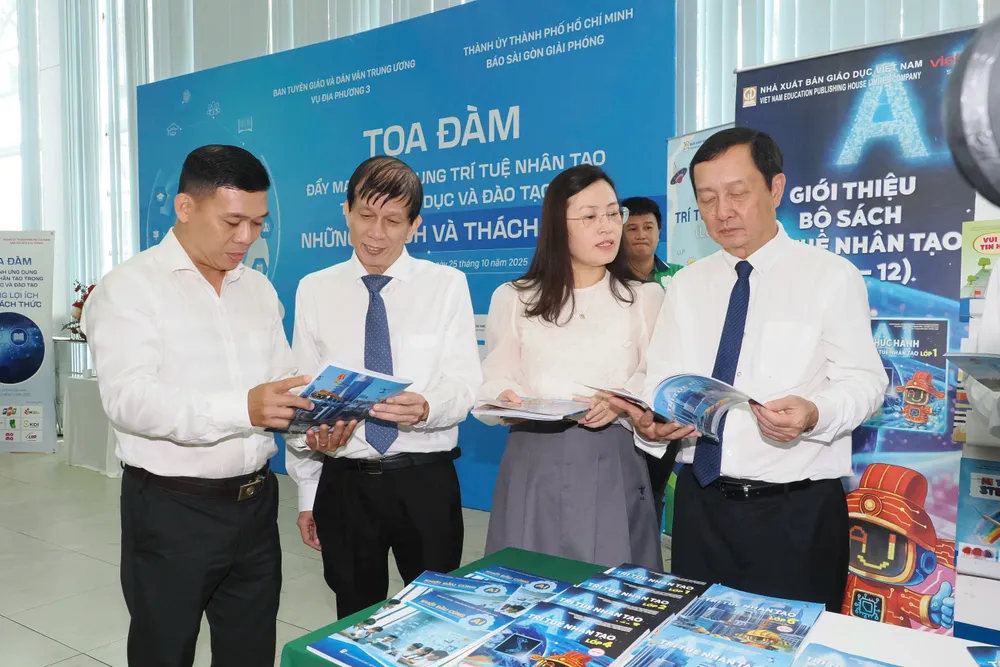
Ethics is the foundation for the sustainable development of digital education.
Speaking at the seminar, Associate Professor Dr. Nguyen Van Vu, Deputy Head of the Faculty of Information Technology, University of Science (Vietnam National University Ho Chi Minh City), raised concerns about ethics in the era of digital education and AI. He cited unfortunate incidents that have occurred worldwide and posed a major question: Technology can support education, but without an ethical framework, it will become a harmful tool.
For over a decade, AI has developed tremendously, ushering in a new era for humanity, especially in the field of education. AI has profoundly impacted search engines, learning resource recommendation systems, virtual assistants, automated grading software, and social networks. It offers opportunities for innovation in teaching and learning methods, but also reveals many potential risks. A deeplyfake video circulating online, a career recommendation system with gender bias, or an addictive learning app all demonstrate that AI can be both a driving force for innovation and a potential threat if ethical control is lacking.

Therefore, the ethical issues in AI are a system of principles, values, and standards aimed at ensuring that this technology is developed, deployed, and used in a fair, transparent, safe, and responsible manner. The ultimate goal is to protect human dignity, freedom, and legitimate interests. Some key elements can be summarized as follows:
- Transparency - the system needs mechanisms for explanation and verification, avoiding a "black box" situation;
- Fairness - technology must not reproduce social prejudices, nor discriminate based on gender, region, or background;
- Responsibility - Individuals and organizations developing and implementing the system must be held accountable for any consequences it causes;
- Protecting human rights - AI must not infringe on privacy, freedom, and human dignity; Humanistically - technology must be geared towards the common good and contribute to sustainable development.
"The important thing is not to avoid technology, but to know how to use it correctly and humanely. Ethics in AI is the foundation for the sustainable development of digital education," Associate Professor Dr. Nguyen Van Vu emphasized.
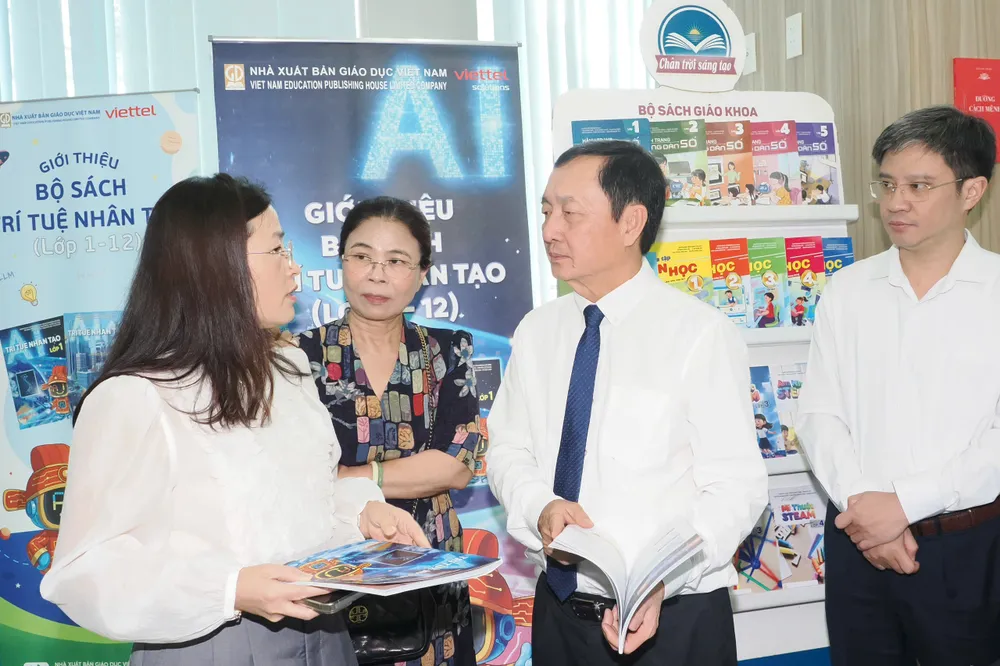
"The teacher uses AI, the student uses AI, and both of them are ignoring it and pretending not to know."
Mr. Le Truong Tung, Chairman of the Board of FPT University, FPT Group, pointed out a reality where many people are hesitant to acknowledge the influence of AI in their work. He argued that the issue is not only about having regulations and rules for using AI, but also about developing training models that are suitable for the development of AI.
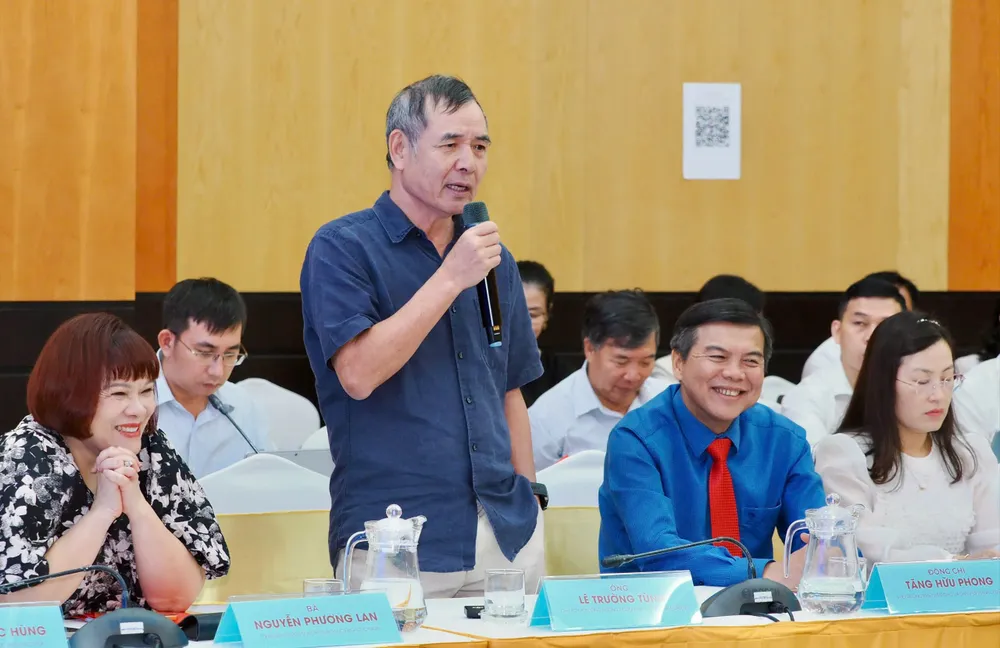
According to Dr. Le Truong Tung, FPT is currently implementing a flipped classroom model that complies with current regulations, in which students' theoretical learning will not occupy much of their time in class; instead, they will focus on problem-solving and innovation.
Professor Hoang Van Kiem: In the AI era, the most important question is "who is more humane?"
Speaking at the seminar, Professor Hoang Van Kiem, Senior Advisor on Information Technology at Saigon International University and former Rector of the University of Information Technology (Vietnam National University Ho Chi Minh City), stated that AI is an achievement of human intelligence and a reflection of ourselves. If we teach AI to speak correctly but forget to teach humans how to live correctly, the danger doesn't come from AI, but from human laziness. Therefore, the most important thing in the AI era is not "who is smarter," but "who is more humane." When humans retain the light of morality, emotion, and creativity within themselves, all technologies – including AI – will become companions in the intellectual and spiritual evolution of humankind.
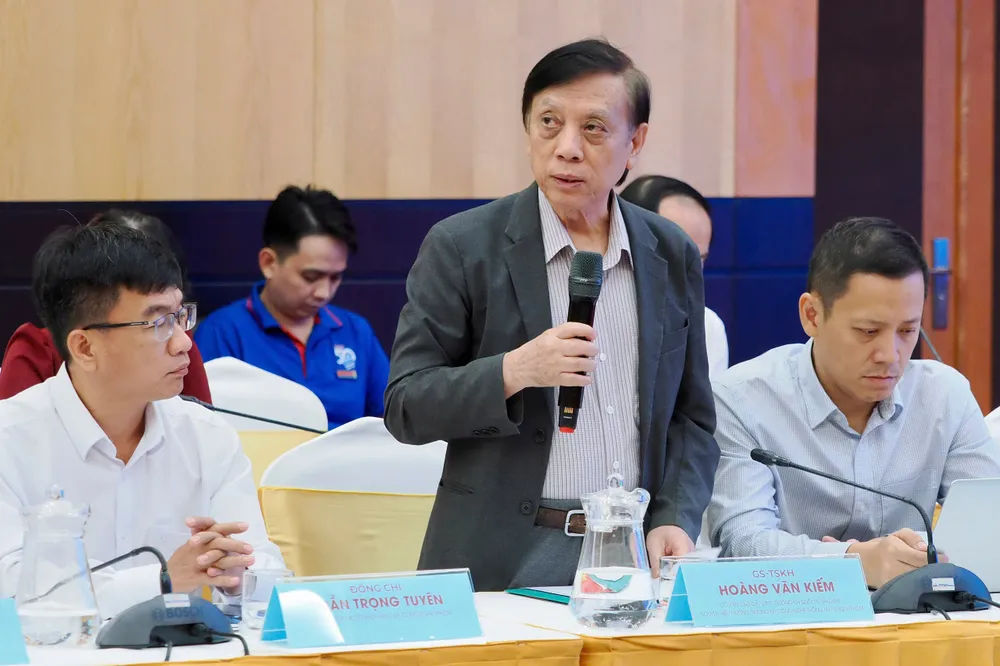
Many countries around the world have implemented AI applications in education, but some have failed due to insufficient preparation. A new set of textbooks takes 6-7 years to complete, so introducing AI into education in Vietnam requires preparation and testing, a process currently underway globally. In my opinion, the implementation roadmap must be tailored to Vietnam's conditions. AI could be implemented in general education in three phases:
Phase 1 is Introduction – Exploration (Primary School) : Gently introduce students to AI through games, images, and fun learning applications. The goal is to help them develop technological thinking and creative curiosity.
Phase 2: Understanding – Basic Application (Junior High School): Students begin to learn the principles of AI, how to ask questions, analyze simple data, and apply AI to learn other subjects.
Phase 3: Creative Thinking – Responsible Use (High School): Students learn how to collaborate with AI to solve problems, conduct small research projects, and develop ethics, responsibility, and personal fortitude in using technology.
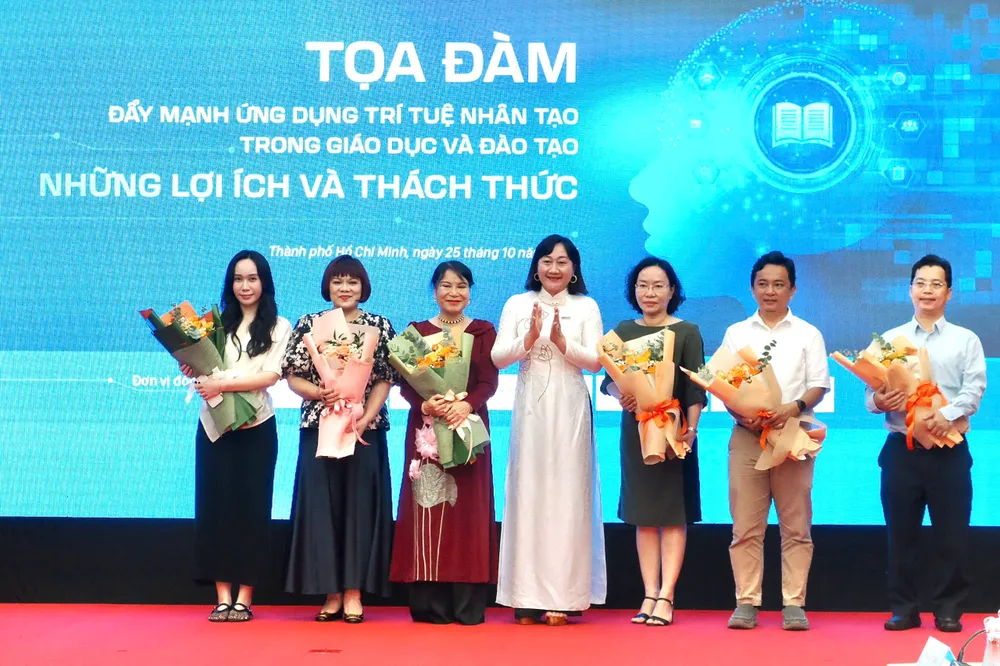
Spreading the spirit of Resolution 71-NQ/TW into education through digital transformation and artificial intelligence.
Comrade Huynh Thanh Dat, Member of the Central Committee of the Party, Deputy Head of the Central Propaganda and Mass Mobilization Department , highly appreciated and commended Saigon Giai Phong Newspaper for proactively proposing and coordinating the organization of the seminar in the current context. The organization of the seminar not only addressed the timeliness and practicality of the issue but also ensured scientific accuracy, objectivity, and directional value in propaganda work, contributing to spreading the spirit of the Party's resolutions into social life.
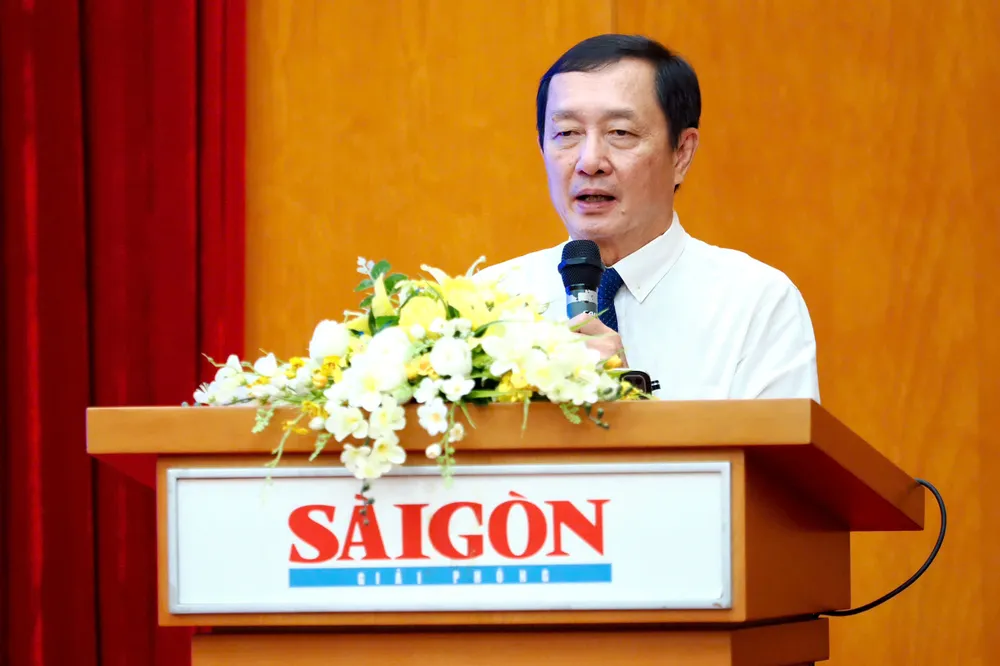
Based on the results and proposals from the seminar, Comrade Huynh Thanh Dat suggested that the Ministry of Education and Training and the Ministry of Science and Technology should soon advise the Government to issue guiding documents for the implementation of the AI Strategy in Education; especially the AI Ethics Framework in Schools and AI programs and materials for the secondary school level.
In addition, he proposed that the Government and relevant ministries and agencies research and establish a Digital Transformation Fund for Higher Education – a strategic investment fund with groundbreaking mechanisms and policies to attract social resources and encourage businesses to invest in digital infrastructure and AI solutions in education.
Higher education institutions need to proactively train and lead in innovation, learning from successful models instead of passively depending on external solutions.
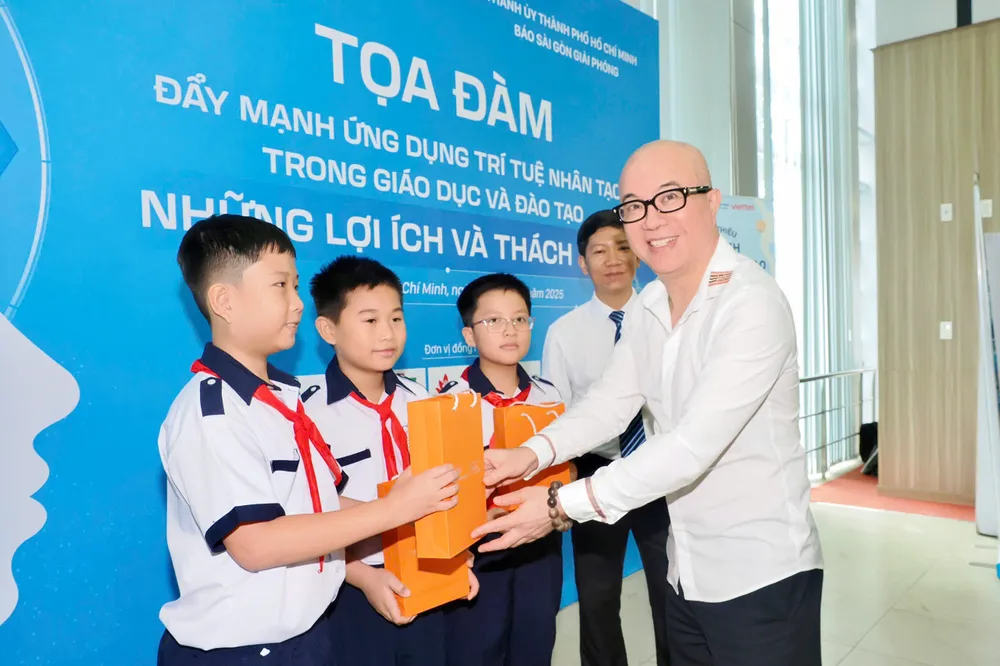
Furthermore, the business community needs to change its mindset, shifting from the role of passive "employers" to that of "co-creators" of human resources.
Finally, news agencies and media outlets need to continue their mission of disseminating information and raising awareness about both the benefits and challenges of AI, fostering social consensus and a proactive mindset among the public, ready for integration.
"I believe that with the spirit of Resolution 71-NQ/TW of the Politburo, and with the support of intellectuals, educators, scientists, and technology businesses, we will build a modern, humane, creative Vietnamese education system that reflects national identity and the spirit of the times," Comrade Huynh Thanh Dat expressed.
Source: https://www.sggp.org.vn/ung-dung-ai-trong-giao-duc-khong-the-thieu-nen-tang-dao-duc-va-trach-nhiem-post819844.html


![[Photo] Closing Ceremony of the 10th Session of the 15th National Assembly](/_next/image?url=https%3A%2F%2Fvphoto.vietnam.vn%2Fthumb%2F1200x675%2Fvietnam%2Fresource%2FIMAGE%2F2025%2F12%2F11%2F1765448959967_image-1437-jpg.webp&w=3840&q=75)

![[Photo] Prime Minister Pham Minh Chinh holds a phone call with the CEO of Russia's Rosatom Corporation.](/_next/image?url=https%3A%2F%2Fvphoto.vietnam.vn%2Fthumb%2F1200x675%2Fvietnam%2Fresource%2FIMAGE%2F2025%2F12%2F11%2F1765464552365_dsc-5295-jpg.webp&w=3840&q=75)



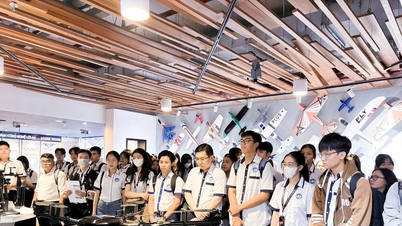



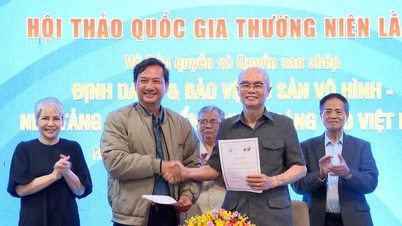

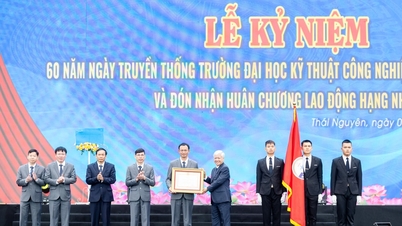















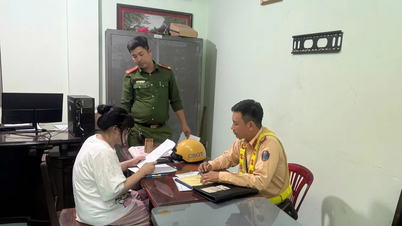



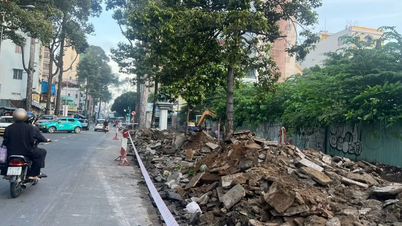






















![[OFFICIAL] MISA GROUP ANNOUNCES ITS PIONEERING BRAND POSITIONING IN BUILDING AGENTIC AI FOR BUSINESSES, HOUSEHOLDS, AND THE GOVERNMENT](https://vphoto.vietnam.vn/thumb/402x226/vietnam/resource/IMAGE/2025/12/11/1765444754256_agentic-ai_postfb-scaled.png)






























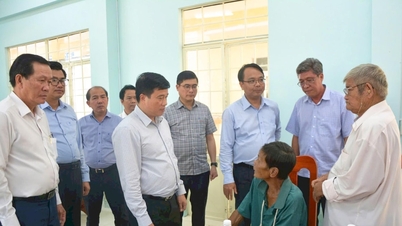





















Comment (0)